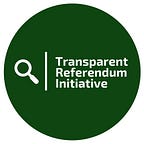When paying makes posts go further, but also points out who’s paying: data insights part 1
By Liz Carolan
I’ve done a bit of analysis the latest batch of social media ads we collected related to the upcoming Irish referendum on abortion. This is the first of 3 short blogs we’ll be putting out in the coming days, this time sharing an insight into the difference paying for reach can make.
A tale of two posts
Two identical posts (same photos, wording, hashtags etc.) were uploaded by the owner of a Facebook page within a month of each other. On the latter occasion, the owners paid Facebook to promote it. The results in terms of the engagement the posts got are as follows:
- January 7th version: 550 “reactions” (likes, angry faces, etc.) and 72 shares
- February 1st (PAID) version: 3,450 “reactions” and 1,476 shares
That is 20 times as many shares. You can see a screengrab of the two posts below — the engagement metrics (reactions and shares) are in the lower left corner. The post on the left was paid.
In the absence of ad identification projects like ours — and the people like you that get involved and help us collect this information — we would not know that the latter post had money behind it. It could look as though “Get the truth out” are a small page developing content which generates high organic reach (they have just 3.5k followers). We only know the post was paid because our tool picked it up.
In fact we might not know at all that the owners of the “Get the truth out” page have decided to spend money trying to influence voter behaviour in Ireland. As it stands, we do not know who these people are. “Get the truth out” is a Facebook page with no information at all; no website, email address, location, contact or ownership information.
However, we now know that the owners of this page are spending money to promote their content, with the aim of influencing Irish voters. We know that their content would not have reached as many voters without that money being spent. And we also know that information about who’s money is being spent is not currently available to those voters and to referendum watchers.
A lot more to do
We are left with more questions than answers. However, if we can grow the data, by increasing the number of people who use the WhoTargetsMe tool, we will at least know what the questions are, and who to ask them to.
